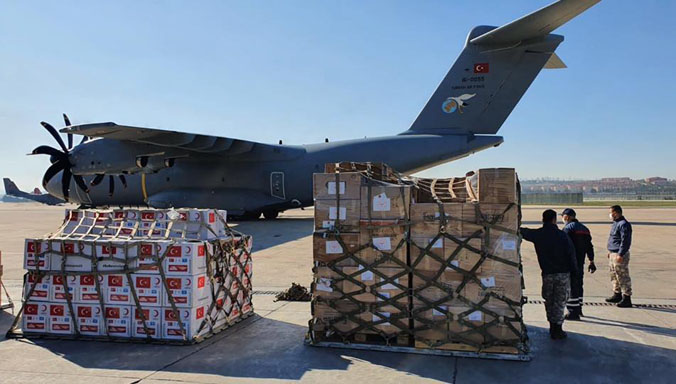Rapid Air Mobility
NATO’s Rapid Air Mobility (RAM) initiative enables Allied military aircraft to deploy swiftly and on short notice across Europe, helping Allies move fast during a crisis. When RAM is activated, aircraft are assigned a unique NATO call sign making it easier to move across borders with essential equipment, supplies and personnel as quickly as possible and in a coordinated manner.

A RAM-enabled flight carried medical supplies and personal protective equipment from Türkiye to the United Kingdom during the COVID-19 pandemic. (Photo credit: Turkish Ministry of Defence)
- NATO’s Rapid Air Mobility initiative is part of its wider military mobility effort to boost the readiness and deployment of Allied troops and assets.
- Allied aircraft receive priority handling by the European Organisation for the Safety of Air Navigation (EUROCONTROL) and can quickly deploy on short notice across Europe during a crisis.
- RAM can be activated during crises and in peacetime.
- The North Atlantic Council has overall political control over RAM, while the authority to activate and run it operationally belongs to NATO’s Supreme Allied Commander Europe (SACEUR).
- In March 2020, in response to the COVID-19 pandemic, an adapted version of the RAM process was activated for the first time, enabling the timely delivery of medical supplies to Allies in need.
How does it work?
NATO’s Rapid Air Mobility (RAM) initiative establishes a special NATO call sign (“OAN”) for any aircraft designated by NATO's Supreme Headquarters Allied Powers Europe (SHAPE) for crisis deployment through fast-track flight planning and airspace handling. The Standing Joint Logistics Support Group at SHAPE monitors and coordinates Allies’ strategic movements.
When an aircraft is allocated the OAN call sign, the European aviation system recognises it as a priority and removes military airspace capacity restrictions for the dedicated flights. These OAN flights receive priority routing through the airspace over Europe.
NATO has worked closely with all the Allies and with the European Organisation for the Safety of Air Navigation (EUROCONTROL) to ensure that the process is safe and effective. The OAN call sign allows EUROCONTROL to remove flight restrictions and coordinate with the relevant air traffic controllers along the flight path, enabling a faster response.
Response to the COVID-19 pandemic
RAM was activated for the first time by the North Atlantic Council on 31 March 2020 in response to the COVID-19 pandemic and was used to support relief flights carrying supplies critical to the fight against the pandemic. The first of these flights took place on 10 April, facilitating the delivery of medical supplies and personal protective equipment from Türkiye to the United Kingdom.
COVID-19 RAM flights incorporated all the same elements of the original intent (NATO call sign, fast-track diplomatic clearance and no route restrictions imposed by EUROCONTROL), but were focused on the rapid transport of medical supplies and other COVID-19 capabilities, such as personnel, using military aircraft.
The activation of RAM flights is a non-permanent arrangement, the duration of which is determined by the North Atlantic Council, through periodic reviews. RAM activation for COVID-19 response was terminated by the Council in August 2021.
Evolution
At the 2018 NATO Summit in Brussels, NATO Leaders declared initial operational capability for NATO’s Rapid Air Mobility initiative.
On 25 October 2019, NATO Defence Ministers welcomed the RAM initiative in the context of increasing the readiness of NATO forces.
On 31 March 2020, in response to the COVID-19 pandemic, the North Atlantic Council authorised the first-ever activation of RAM for military aircraft carrying medical supplies through Europe’s airspace in support of COVID-19 flights.
On 10 April 2020, RAM facilitated the first military air transport, namely for the delivery of medical supplies and protective equipment from Türkiye to the United Kingdom.
At the 2021 Brussels Summit, NATO Leaders welcomed full operational capability of RAM, noting that it was activated and utilised by Allies for relief flights carrying critical supplies to Allies and partners in response to the COVID-19 pandemic.
RAM was activated in August 2021 as part of Operation Allied Solace, the Alliance’s effort to assist with the resettlement of NATO-affiliated Afghans and their families at the end of NATO’s Resolute Support Mission in Afghanistan.
In February 2022, RAM was activated to help strengthen NATO’s deterrence and defence posture following Russia’s brutal and unprovoked invasion of Ukraine.
